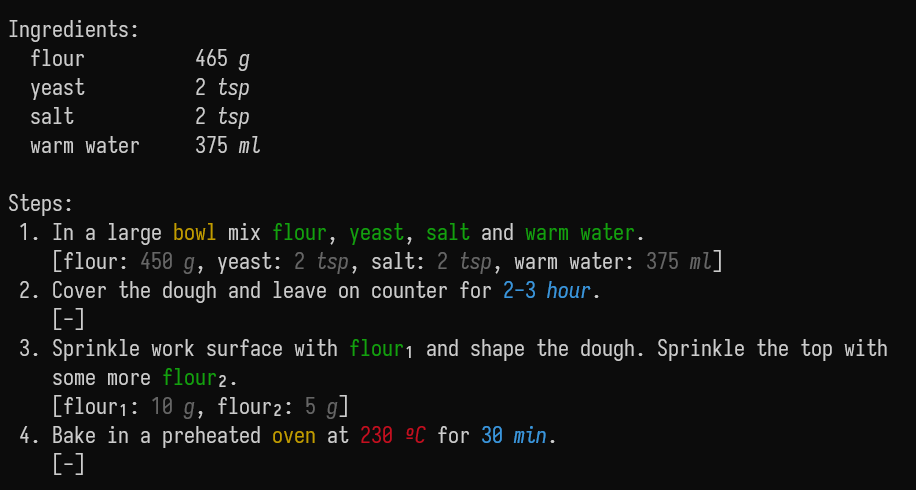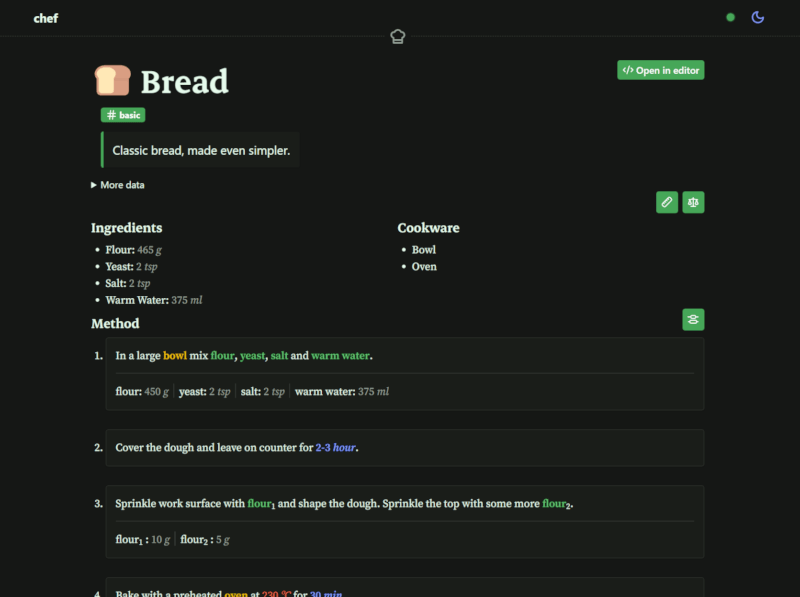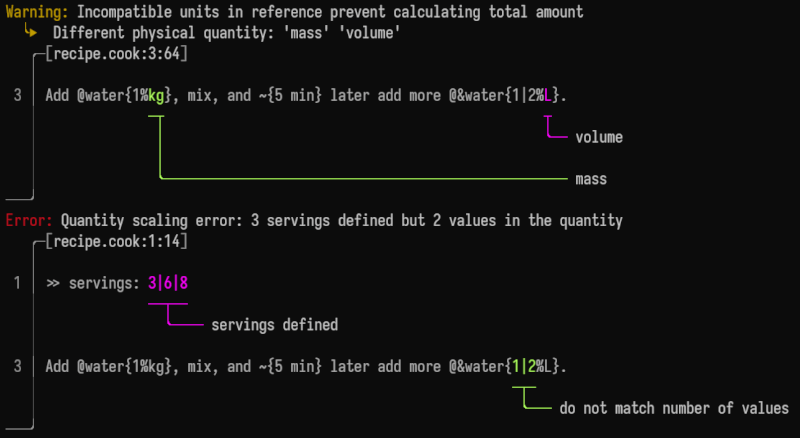22 releases
| 0.10.0 | Jan 14, 2025 |
|---|---|
| 0.9.2 | Dec 20, 2024 |
| 0.9.1 | Apr 18, 2024 |
| 0.8.5 | Feb 27, 2024 |
| 0.4.2 | Jul 23, 2023 |
#69 in Parser implementations
13,977 downloads per month
425KB
7K
SLoC
Contains (WOFF font, 38KB) ui/assets/fonts/Typey_Italic.woff2, (WOFF font, 34KB) ui/assets/fonts/Typey.woff2
cooklang-chef
A CLI to manage cooklang recipes with extensions.
The parser has been moved to cooklang/cooklang-rs
0.10.xwill be the last version ofchefpublished oncrates.io.
0.15.xwill be the last versions ofcooklang-fs,cooklang-to-cooklangcooklang-to-humanandcooklang-to-mdpublished oncrates.io.
What is cooklang
Cooklang is a markup language for cooking recipes. An in depth explanation can be found in cooklang.org.
An example cooklang recipe:
In a large #bowl mix @flour{450%g}, @yeast{2%tsp}, @salt{2%tsp} and
@warm water{375%ml}.
Cover the dough and leave on counter for ~{2-3%hour}.
Sprinkle work surface with @&flour{10%g} and shape the dough. Sprinkle the top
with some more @&flour{5%g}.
Bake with a preheated #oven at 230ºC for ~{30%min}.

What is cooklang-chef
chef is a CLI to manage, read and convert cooklang recipes.
I wanted a couple more features that cooklang did not have, so I extended the cooklang syntax and semantics a bit.
All regular cooklang files parse as the same recipe, the extensions are a superset of the original cooklang format. Also, the extensions can be turned off, so the parser can be used for regular cooklang if you don't like the extensions. All extensions except the multiline steps are enabled by default[^1].
[^1]: This is done to maximize compatibility with other cooklang parsers.
You can see a detailed list of all extensions explained in the parser repo.
Full user documentation here.
You can install chef with:
cargo install --git https://github.com/Zheoni/cooklang-chef/ --tag "v0.10.0" --locked
You can also get a prebuilt binary from the github releases.
After installing it, run:
chef config --setup
Key features:
-
Web UI. The CLI comes with an embedded web UI.
- Scale and convert the quantities.
- Hot reload of recipes. Just edit the
.cookfile and save. - Open the
.cookfile in a code editor.

-
Ingredient references. You can now refer to ingredients you already used before. I think the most important extension to the original cooklang. You can read about using references in this document.
-
Good error reporting. Error reports are a top priority.
This little recipe contain errors:
>> servings: 3|6|8 Add @water{1%kg}, mix, and ~{5 min} later add more @&water{1|2%L}.
-
Units. An ingredient quantity means nothing without a unit. This is why the units are parsed and checked. With units come:
- Unit conversion. You can read your recipe in your prefered unit system.
- Configurable units. You can add, remove and rename units.
Crates
- Cooklang parser
- The CLI
- cooklang-fs.
Utilities to deal with referencing recipe, images and data related to recipes that are in other files.
- cooklang-to-cooklang.
Recipe back to Cooklang.
- cooklang-to-human.
Write a recipe in a human friendly way.
- cooklang-to-md.
Recipe into Markdown.
Dependencies
~16–32MB
~531K SLoC